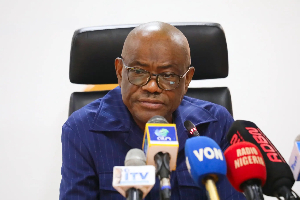The economy in the outgoing year is bad for Nigeria for several reasons. Petrol subsidy was removed thus sending the price of every other item skyrocketing.
Inflation especially of foodstuff hit the roof. Renowned economists have been talking about what to expect in 2024.
Verdict: 2023 is a bad year. 2024 may be worse unless certain things are done by the government.
Time to sell under-performing national assets — Prof. Teriba
Prof Ayo Teriba, Chief Executive Officer (CEO), of Economic Associates, said, “Actually, we have been desperate for foreign direct investment (FDI) since the time of recession, and nothing remarkable has happened.
“The third-largest exporters are China. They have 212 billion barrels of crude in their country, and they are still exporting more. How can we help Nigeria?
“Our 34-year-old Export Prohibition Act is restricting the export of certain agricultural commodities amid acute dollar shortages rocking Africa’s biggest economy.
“The Act has been limiting lots of export activities and investments in the yam, cassava, beans, maize, and rice value chains and their derivatives despite being leading producers of some of these crops. “Furthermore, we have national assets that are lying in waste. We have our new international airport: that’s an investment, but it’s not giving the results that we want. So, how do we avoid that?
“You don’t sign your assets to countries to own. You do need investors, but if the investors go wrong, the investment will be cleared, and that can lead to something else.
“We have lands that are wasting, and we just have to connect investors to sectors with absorptive capacity.
“If you connect them, there will be a change, and onlookers will come back because what makes us competitive is that our own transportation cost and energy costs are higher than what others obtain.
“China is the biggest exporter in the world, and so they have all that they want. We just need the opportunity to be better and look for investors that can invest.
“We have to make some changes in the next 2 to 3 months, and the narratives will change. Time is right for the government to target assets, including sales of its abandoned government-owned enterprises, focusing on real estate properties and exploring abandoned infrastructure, as a leeway to successfully finance the 2024 budget.
“It is time to eliminate multiple taxation and borrowing as ways to finance the country’s budget.
“This was the reason the country’s budgets have been underperforming since most revenue realised is being channelled to debt servicing payments.
“President Bola Tinubu has assured Nigerians, as part of its Renewed Hope Agenda, that his government won’t venture into compulsory loans from international donors to run the country’s budget. “Government should focus on the country’s assets that are underperforming, abandoned government’s owned enterprises, projects and equities to get revenue to finance the budget. “Government-owned enterprises that are underperforming as a yardstick for most generating revenue.
“What are we proposing to do to these government-owned owned enterprises? We should be explicit about it.
“Kenya is proposing to take 35 per cent of government-owned enterprises to the markets to generate some liquidity from the asset’s value. The government should also look at real estate.
“There is no state that does not have one choice of real estate that they own. But if you check, most of them are lying there idle.
“It is time to look at the potential value of real estate and the value we are getting from the current use.
“Everybody has something, an asset that can be called upon that can be used to attract investments and turn around our liquidity factor.
“I am saying that if we miss the 2024 budget train, we will not do anything about these things until 2025.
Proposed recapitalization of banks will support targeted $1trn economy —Ucheagwu, Valmon Securities
Dr. Chukwuma Ucheagwu, Associate Member of the Chartered Institute of Stockbrokers of Nigeria and General Manager of Valmon Securities Limited, said, “As of 30th November, the All-Share Index (ASI) had crossed 70,000 basis points representing a year-to-date of 39.35%.
“This performance can be attributed to new listings, and investment of trapped funds among other factors.
“The market recorded this stellar performance despite concerns around rising inflation, interest rate hikes and foreign exchange rate volatility.
“We expect the bullish sentiment that ruled the market in 2023 to continue in 2024 on the back of the market-oriented policies of the current administration aimed at opening the economic space.
“We also expect most of the government policies will begin to materialise in the second quarter of 2024 and inflation begin to taper.
“Stock Market performance in 2024 will be driven by the following factors: Faithful Implementation of the 2024 budget; proposed recapitalization of banks to provide headroom for risk-taking and support the targeted $1 trillion economy; influx of foreign investors in key sectors of the economy in response to the current government’s policies; implementation of market and institutional reforms; improved security situation while market correction may set in after release of Q4 2023 results”.
Winning war against insecurity will curb food inflation —Mallam Ibrahim Yahaya, Chairman, Arewa Economic Forum
“There’s no significant change in the budget of the 2024 as compared to the 2023 budget, according to Mallam Ibrahim Yahaya, Chairman, Arewa Economic Forum.
His words: “One thing we are so much happy about is the huge allocation to the Ministry of the Defence and the fact that the Ministry has been given to the people that are more concerned about the security issue in Nigeria as the Ministers are all from the North, while the National Assembly has approved substantial increase in allocation which we are happy with; remember that the Ministers are both from the epicentre of banditry and terrorism. So, we look forward to seeing a change and we are going to hold them responsible for the failure or success of the war against insecurity.
“Apart from the budget, the other thing we’ve seen in northern Nigeria has to do with agriculture, transportation, and education outside of the security issue we are facing. “Security is the most important thing in northern Nigeria, especially North-East, North-West and increasing now in North-Central.
“Recently it has been in Benue, Taraba, and Adamawa states. The increase in the budget and the coming of the CDS and the other Service Chiefs, we’ve have seen significant change in the dimension in which this Federal Government is addressing this insecurity issue and we are looking positively towards 2024 as far as this is concerned. I want to look at the issue of food security and agriculture in Nigeria, you would agree with me that the North has about 70% of arable land in Nigeria and this influenced them to become the food basket of Nigeria. The Agriculture Ministry has been given a lot of funding and this government has done something that is very significant – making a northerner the supervising Minister and voting substantial funds to the Ministry in the 2024 budget. “These two factors going together: winning the war against insecurity and ensuring food security, would definitely curb food inflation and therefore have a significant impact on Nigerians in the year 2024”.
Sustained war against oil theft will boost foreign reserves —Muda Yusuf, CPPE
On his part, Dr Muda Yusuf, founder of the Centre for the Promotion of Private Enterprise (CPPE), says the economic headwinds and shocks of 2024 may not be as severe as what was experienced in 2023.
According to the immediate past Director General of the Lagos Chamber of Commerce and Industry (LCCI), the efforts of the Central Bank of Nigeria (CBN) in clearing the FX mature obligations, the removal of policy barriers to FC inflows and the import substitution effects of domestic refining of petroleum products should have a considerable impact on the economic outlook for 2024.
“The efforts of the government to curb the menace of oil theft and boost crude oil output would positively impact on the outlook for foreign reserves and the stability of the exchange rate”, he said.
“Already the fiscal space is getting better following the revenue effects of the fuel subsidy removal and the steps towards exchange rate convergence.
“However the challenge of insecurity, crude oil theft, rising recurrent expenditure and the social outcomes of economic reforms are potential risks to the outlook.
“The biggest challenge to our manufacturing sector is the huge exposure to the external sector, specifically imported raw materials.
“The sector outlook will depend to a large extent on the stability of the foreign exchange market and the related forex liquidity.
“However, to the extent that the CBN had demonstrated a clear commitment to the stabilisation of the foreign exchange market, the manufacturing sector outlook may be more on the upside in 2024.”The rising prospects of heightened domestic petroleum refining activities would impact positively on backward integration outcomes for the manufacturing sector. “The expected increase in domestic petrochemical output will hopefully ease the pressure of importation of raw materials by manufacturers”.
Business News of Sunday, 31 December 2023
Source: www.vanguardngr.com













